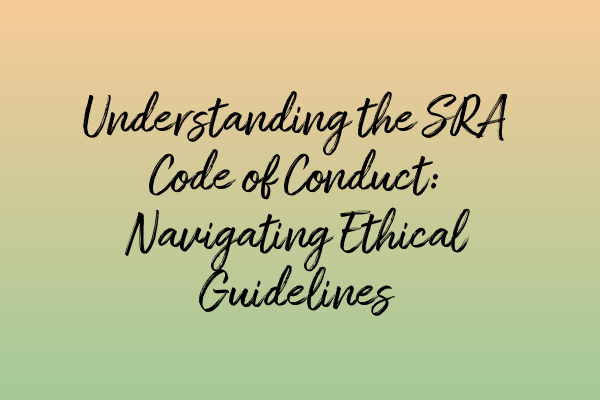Understanding the SRA Code of Conduct: Navigating Ethical Guidelines
As a solicitor, it is essential to have a thorough understanding of the Solicitors Regulation Authority (SRA) Code of Conduct. This code sets out the ethical guidelines that solicitors must adhere to in their professional practice. In this blog post, we will delve into the importance of understanding the SRA Code of Conduct and provide you with valuable insights on how to navigate these ethical guidelines effectively.
The SRA Code of Conduct can be seen as the cornerstone of professional ethics and responsibility for solicitors in England and Wales. It outlines the standards of behavior and professional conduct expected from solicitors, ensuring that they uphold the highest levels of integrity and maintain public trust in the legal profession.
Key Principles of the SRA Code of Conduct
The SRA Code of Conduct is organized around a set of key principles that solicitors must uphold at all times. These principles serve as a guide to ethical behavior and provide a framework for solicitors to navigate the complexities of the legal profession.
1. Integrity
Integrity is the foundation of the legal profession. Solicitors must act honestly and ethically, maintaining the trust and confidence of their clients and the wider public. It is crucial to always act in the best interests of the client, avoiding any conflicts of interest that may compromise integrity.
2. Independence
Solicitors must exercise independent professional judgment and not allow any external pressures or influences to compromise their ethical responsibilities. Independence ensures that solicitors can provide objective and unbiased advice to their clients, promoting justice and fairness.
3. Confidentiality
Confidentiality is paramount in the solicitor-client relationship. Solicitors have a duty to keep all client information confidential, except in certain circumstances where disclosure is required by law or necessary to prevent harm. Protecting client confidentiality is essential for building trust and maintaining the integrity of the legal profession.
4. Competence
Solicitors have a duty to provide competent and diligent legal services to their clients. This requires maintaining and enhancing professional knowledge and skills, staying updated with changes in the law, and ensuring that clients receive quality legal advice and representation.
5. Professionalism
Professionalism encompasses a range of qualities and behaviors that solicitors must embody. This includes treating others with respect, acting with honesty and integrity, and complying with legal and regulatory requirements. Professionalism also involves providing access to justice, promoting equality and diversity, and upholding the rule of law.
Navigating the Ethical Guidelines
Now that we have a clear understanding of the key principles outlined in the SRA Code of Conduct, let’s explore how solicitors can navigate these ethical guidelines effectively.
1. Familiarize Yourself with the Code
The first step in navigating the SRA Code of Conduct is to familiarize yourself with its content. Take the time to read and understand the code thoroughly. Pay close attention to the principles and their corresponding outcomes, as these provide guidance on how to apply the code in practice.
2. Continuous Professional Development
To navigate the ethical guidelines effectively, solicitors must engage in continuous professional development. Stay updated with changes in the law, attend relevant training programs, and participate in seminars and workshops to enhance your knowledge and skills. Continuous learning is crucial to maintaining competence and delivering high-quality legal services.
3. Seek Guidance
If you encounter a situation where the application of the SRA Code of Conduct is unclear, seek guidance from senior colleagues or the SRA itself. Asking for guidance demonstrates your commitment to ethical practice and ensures that you make informed decisions in the best interests of your clients.
4. Regularly Review and Update Policies and Procedures
To ensure compliance with the SRA Code of Conduct, regularly review and update your firm’s policies and procedures. This includes addressing issues such as conflict of interest, confidentiality, and data protection. By having robust policies in place, you create a culture of ethical conduct within your firm.
5. Monitor and Evaluate Compliance
Monitoring and evaluating your firm’s compliance with the SRA Code of Conduct is essential. Keep track of any complaints or disciplinary matters and take appropriate action if needed. Conduct regular internal audits to identify any areas where improvements can be made and implement corrective measures.
Conclusion
Understanding the SRA Code of Conduct is central to maintaining professional ethics and fulfilling your responsibilities as a solicitor. By adhering to the key principles of integrity, independence, confidentiality, competence, and professionalism, solicitors can navigate the ethical guidelines effectively and ensure the highest standards of legal practice.
For more information on related topics, please check out these articles:
– Private Prosecutions: Exploring Non-Governmental Prosecutions in Criminal Cases
– Understanding Drug-related Offences: Laws and Penalties in the UK
– Magistrates’ Court vs Crown Court: Different Paths in Criminal Proceedings
– Criminal Defence Strategies: Expert Approaches to Protecting Clients’ Interests
– Demystifying Criminal Law Procedures: A Step-by-Step Guide
Remember, by staying informed and acting in accordance with the SRA Code of Conduct, you not only protect your clients’ interests but also contribute to the integrity and reputation of the legal profession.


Leave a Reply